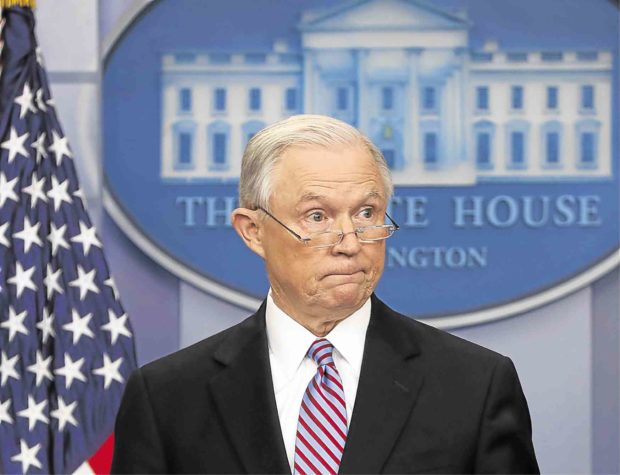
Jeff Sessions —AP
WASHINGTON—The ouster of Attorney General Jeff Sessions by President Donald Trump on Wednesday drew sharp criticisms from both Democrats and Republicans, who warned the latter against moving to squash a probe of Russian meddling in the 2016 US presidential election.
Under the supervision of the Department of Justice, special counsel Robert Mueller is investigating whether Trump’s campaign colluded with Russia and whether Trump unlawfully tried to obstruct the probe, along with possible financial misconduct by the president’s family and associates.
The special counsel also has brought charges against Trump’s former campaign chair and other campaign figures, along with 25 Russians and three firms accused of meddling in the campaign to help Trump win. Trump has denied his campaign colluded with Russia.
As the probe continued to cloud his presidency, Trump kept complaining about Sessions recusing himself from supervising Mueller and entrusting the task instead to Deputy Attorney General Rod Rosenstein.
Close to tears
In a Twitter message, the medium he often uses for dismissing subordinates, Trump announced on Wednesday that he had replaced Sessions with Matthew Whitaker whom he appointed acting attorney general. Whitaker is Sessions’ former chief of staff.
Sessions, 71, said in an undated letter to Trump: “At your request, I am submitting my resignation.” He looked close to tears as he was applauded by the staff on his way out of the justice department building on Wednesday night.
‘Trump will be held accountable’
Democrats voiced fears the removal of the top US law enforcement officer may be an attempt to undermine or end the investigation.
“Congress must take bipartisan action to protect the integrity of Mueller’s investigation,” Steny Hoyer, the No. 2 Democrat in the House of Representatives, said after Democrats won a House majority in Tuesday’s elections.
If Sessions’ departure was an “opening move” by Trump to meddle in Mueller’s investigation, Hoyer said in a statement, “the president must be held accountable.”
Democrats also raised concerns about the appointment of Whitaker, 49, who will now oversee Mueller’s probe.
The Republican Party loyalist wrote an opinion piece for CNN in August 2017 that argued Mueller had too much latitude in his investigation. Whitaker also said the probe should not extend to the finances of Trump, his family or their business.
Sen. Chuck Schumer of New York said in a statement that Whitaker should recuse himself from the Russia probe in light of “his previous comments advocating defunding and imposing limitations on the Mueller investigation.”
Republican reaction
Democratic Rep. Jerrold Nadler, who is expected to chair the House judiciary committee starting in January, said removing Sessions fit Trump’s pattern of interfering in the work of the justice department and Mueller.
“Donald Trump may think he has the power to hire and fire whomever he pleases, but he cannot take such action if it is determined that it is for the purposes of subverting the rule of law and obstructing justice,” Nadler said in a statement.
Mitt Romney, the Republican Party’s 2012 presidential nominee who won the Utah race on Tuesday to become a US senator, also said Mueller’s probe should not be affected by Sessions’ dismissal.
“Under acting Attorney General Matthew Whitaker, it is imperative that the important work of the justice department continues, and that the Mueller investigation proceed to its conclusion unimpeded,” Romney said on Twitter.
Mass protests set
Outside US Congress, progressives activated a plan for mass protests across the United States, starting at 5 p.m. on Thursday in all time zones.
According to legal analysts cited by The Guardian, Trump’s decision may set off a constitutional crisis over the fate of the Mueller inquiry, which followed a conclusion by US intelligence agencies that Russia intervened to help Trump win in 2016.
Laurence Tribe, a constitutional law professor at Harvard University, said Trump’s replacement of Sessions with Whitaker was arguably an impeachable offense in itself. “This rule of law crisis has been a slow-motion train wreck for a long time,” Tribe said.
Harsh attacks
Never in modern history has a president attacked a Cabinet member as frequently and harshly in public as Trump did Sessions, a former US senator from Alabama and one of the first members of Congress to back Trump’s presidential campaign in 2015.
Trump was only a few weeks into his presidency in March 2017 when Sessions upset him by stepping aside from overseeing an FBI probe of potential collusion between the Trump campaign and Moscow.
As reason for his recusal, Sessions cited news reports of two undisclosed meetings he had with Sergey Kislyak, then Russia’s ambassador to Washington.
Rosenstein, the deputy attorney general, took over supervision of the Russia investigation. He appointed Mueller in May 2017 as the justice department’s special counsel to take control of the FBI’s Russia probe after Trump fired FBI Director James Comey.
Despite Trump’s criticism of the probe as a “witch-hunt,” Sessions and Rosenstein both defended Mueller’s integrity.
Weak and beleaguered
In piercing attacks, Trump called Sessions weak and beleaguered. Just recently, he told an interviewer that Sessions “never had control” of the justice department.
Sessions endured the name-calling in silence, even as he aggressively carried out the administration’s conservative policies, such as stripping federal funding from so-called sanctuary cities and states and rescinding protection for young adults brought into the country illegally as children.
He also backed Trump’s ban on the entry into America of people from several Muslim-majority countries.
A permanent replacement for Sessions must be confirmed by the Senate, which Trump’s Republicans will continue to control as a result of Tuesday’s midterm elections. —REPORTS FROM AP AND THE GUARDIAN